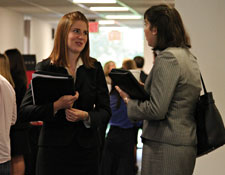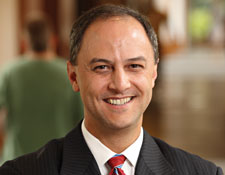Office of Career Services Responds to Market
by Mary Wood and Cullen Couch
Facing one of the most difficult job markets in recent memory, the Law School hired Kevin Donovan, a former litigation partner at Morgan, Lewis & Bockius in Philadelphia, to serve as head of the Office of Career Services.
“Kevin Donovan combines managerial skills with a detailed knowledge of the law firm world,” said Law School Dean Paul G. Mahoney. “I’m very pleased that he will be hereto help our students during a difficult time in the market for legal services.”
Donovan, who began his post as senior assistant dean for career services this month, was a litigator at Morgan Lewis for 18 years and served as the firm’s pro bono chair from 2003–08. At the firm he was heavily involved in recruiting and helped run three summer associate programs.
Donovan’s practice focused on complex tort cases, including class actions and national serial litigation. He also was involved in commercial litigation, bankruptcy litigation and intellectual property litigation. He clerked for U.S. District Judge Frank J. Battisti in the Northern District of Ohio after graduating from the University of Pennsylvania Law School.
Donovan said he was excited to bring his experience in career services to the University of Virginia.
“I had been doing the same type of litigation for pretty much my whole career, and I had always thought that I would like to work in an academic setting,” said Donovan. “I was at a point in my career where I was ready for something different. So the last two or three years my wife and I made the decision to start looking and, if the right opportunity came along, we were going to seize it. In my 18 years of working at Morgan Lewis, I had only applied for one job, and that was this job. This is a great town, a great institution, the community has been incredibly welcoming, and I couldn’t be more impressed with the students.”
Donovan recently discussed some of the issues facing students, alumni and the legal profession in a challenging job market.
What are your goals for Career Services?
My goal is that we would be a resource to and an advocate for the students as they go into this very challenging job market — that we give them real value in their job searches, help them to think through the options that are out there, to self-assess and to think about where they would be happy and fulfilled in a job.
How is Career Services responding to challenging economic conditions?
We are looking more broadly at the legal services industry. We’re looking at employers of all types and all sizes. We’re involved in direct outreach to employers to try to get the best sense of how the market is changing, and of where jobs are available. We’re focusing heavily on clerkships and public service opportunities and we’re tracking very carefully the data that’s available on what’s happening with the market and with the availability of jobs. So we’re trying to get as much information together as possible so that we can help people to find the jobs that are out there in the markets and cities in which they’re looking.
What can students expect from the Career Services Office?
We try to help students on all levels of the job-search process and so we will look at their resumes, help them with cover letters, and help them think through the process of self-assessment, in which they try to think through what types of jobs would be the most fulfilling for them. We help them assess geographic markets, different law firms, different clerkships, to find the opportunities that fit best with their particular backgrounds and credentials.
 How are you preparing students for today’s job market?
How are you preparing students for today’s job market?
Our advice to students right now is to think about where they would like to be, to think about what legal skills they enjoy using and what types of jobs would employ those — but then to look more broadly than they might have in the past. Some students may need to reach out beyond on-Grounds interviews to firms of different sizes, if they’re looking at firms. The clerkship market also is going to be very competitive. Along those lines, we have created a new Office of Judicial Clerkships headed by Ruth Payne ’02. The office will be working with students to focus their search efforts and to maximize their likelihood of success. To increase their flexibility, we also have expanded the number of clerkship applications that students can make through the Law School.
What do you tell alumni who are looking for jobs?
We tell them to stay positive. People who come from this school are fabulously qualified and they have a great deal to offer employers in the legal services market. The first-rate legal education and practical skills development that the Law School provides puts graduates from this school in a uniquely strong position. So we help alumni find the employers who are still hiring and to make the best possible case for themselves as they market their services to employers.
How will the legal profession be affected by the changing economy?
The legal profession is changing. Clients in the private sector are more reluctant to have matters handled by attorneys who are junior and don’t have an established skill set. So for employers to be able to sell the services of junior lawyers, they need people who they can credibly say have the type of skills that they need to practice. So there is more of an emphasis on developing practical skills as part of the process of legal education. Fortunately, Virginia is well ahead of the game with its many clinical programs, its pro bono program, and its well-established Law & Business Program. All of those things tend to put Virginia graduates in the vanguard of the marketplace with a higher level of practical skill than many of their peer schools.
People ask, ‘Will these jobs come back?’ I think the answer is: The jobs will come back, but whether they will all come back with the same firms or end up landing someplace else is an open question. I think that the smart and the nimble, as in all eras, will benefit during this time as well.
What was your experience with Virginia graduates during your career in private practice?
Excellent. That was why I was interested in this job in the first place — my experience with Virginia alums over the years. One, it was the character and caliber of people who came out of here, but it was also the way they spoke in such glowing terms about the institution. It reminded me more of how people speak of their undergraduate experience, which is relatively rare for a graduate school. That really intrigued me about the possibility of working here. We also saw that Virginia people tended to be those who were involved in the fabric of the firm, the life of the firm. They were recruiters, leaders, took on additional roles.
What feedback did you get from the recent round of on-grounds interviews?
The students were exceptional. They showed fortitude; they worked very hard to get ready. The employers almost to a person said that this was one of the best prepared groups that they had seen. The students spent time researching the firms and came into the interview very educated about the firms and the firm culture.
This is a market that favors Virginia graduates because many law firms know our graduates have the basic workplace competencies that go beyond good lawyering and make someone a very successful associate or partner candidate. So, I think when it gets really tough and firms have to cut back, we’re a school that’s difficult to cut back on. We had a number of interviewers tell us that they had cut back on other schools but had chosen not to cut back on interviewing at Virginia.
Overall, the recruiters seemed guardedly optimistic. We’re not out of the woods, yet, but a number of firms reported that things are moving in the right direction. It remains to be seen; many firms are maintaining a cautious and conservative approach to hiring this year. Certainly the big trends I see are a number of firms moving away from lock-step to give them more flexibility in their compensation systems and many firms focusing on getting meaningful experience for their associates. Virginia is well positioned to address that.





